When athletes retire, you might feel a deep sense of loss due to your parasocial relationship—an emotional bond that feels personal even without direct interaction. This connection often triggers feelings of sadness, nostalgia, and confusion, as the athlete symbolized hope, joy, or inspiration in your life. Your emotions may intensify through media and social platforms, making the loss seem even harder. Keep exploring to understand how you can cope and navigate these complex feelings.
Key Takeaways
- Fans develop emotional bonds with athletes, leading to grief when athletes retire due to perceived personal loss.
- Retirement triggers feelings of nostalgia, sadness, and a sense of missing a personal connection, characteristic of parasocial grief.
- Media and social platforms deepen parasocial bonds, making retirement feel like losing a close, familiar presence.
- Fans may experience persistent longing, replaying memories, and emotional reactions similar to mourning a friend.
- Coping involves celebrating achievements, reframing the relationship, and engaging in new routines or fan communities.
Understanding Parasocial Relationships in Sports
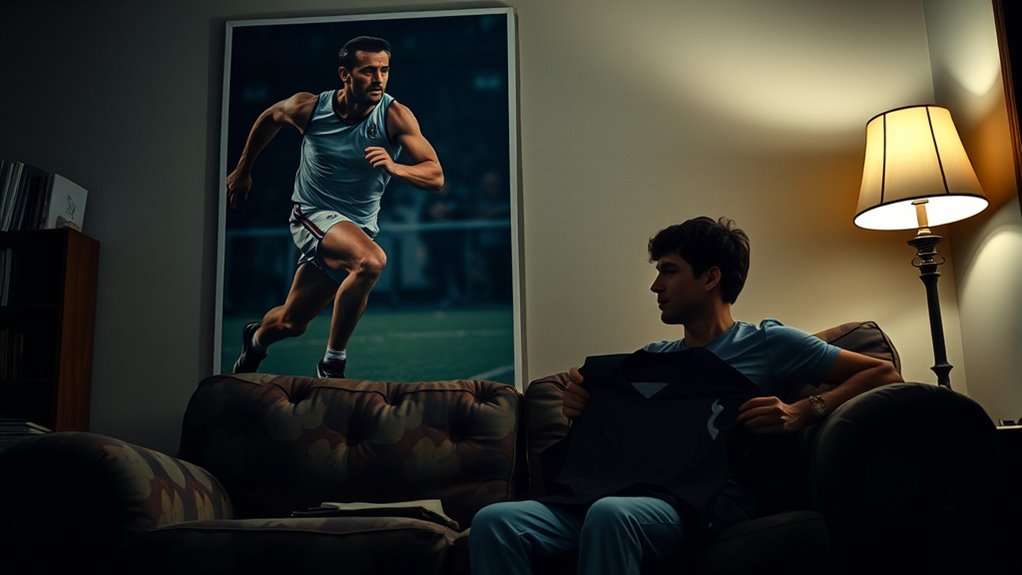
Many sports fans develop close emotional bonds with athletes they’ve never met in person. These connections are known as parasocial relationships, where you feel a sense of familiarity and attachment despite the lack of direct interaction. Your fan loyalty deepens as you follow every game, social media post, and interview, fostering a sense of personal connection. Celebrity admiration plays a significant role, as you often see these athletes as role models or sources of inspiration. These feelings can feel just as intense as real relationships, making their successes and setbacks emotionally impactful. Recognizing that these bonds are one-sided helps you understand why athlete retirements can trigger feelings of loss—because your connection goes beyond mere fandom. Understanding the vetted – ID Times concept of parasocial attachments can help you navigate these complex emotional reactions.
The Emotional Impact of Athlete Retirement

When an athlete announces their retirement, it often feels like the end of an era for dedicated fans. Their departure can trigger a wave of emotional impact, as you realize that your connection was deeper than just watching games. Celebrity influence shapes your admiration, making the athlete seem larger than life. Your fan loyalty intensifies these feelings, as you’ve invested time and emotion into supporting them. The loss can evoke sadness, nostalgia, and even a sense of personal grief, because your sense of identity is intertwined with their career. You might mourn the end of shared experiences and the moments you cherished. This emotional response underscores how powerful parasocial bonds are, transforming athletic retirement into a personal event for many fans. Recognizing the emotional significance of these bonds can help explain why such retirements feel so impactful.
Why Fans Feel a Sense of Loss
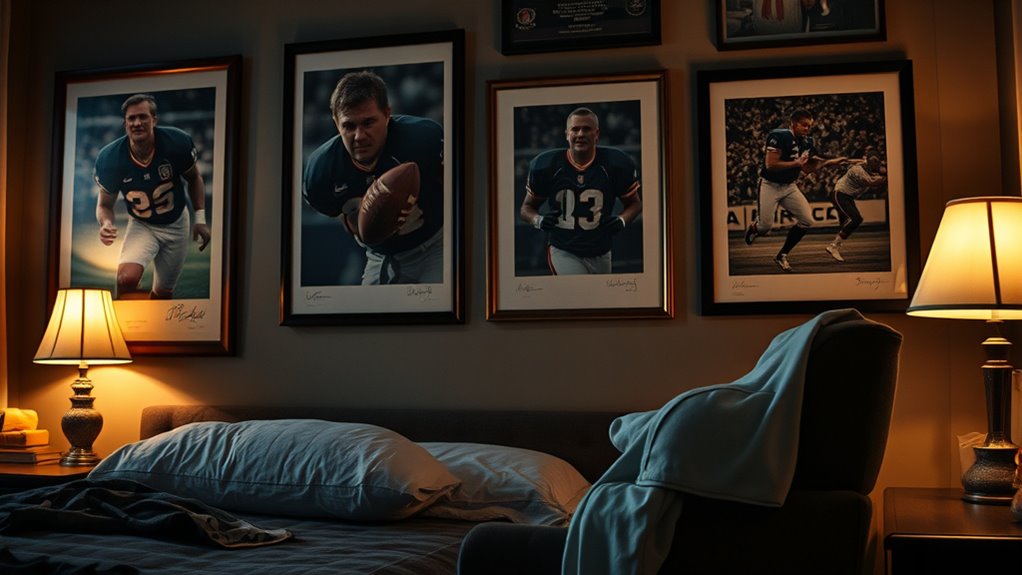
You feel a sense of loss because your connection to the athlete runs deeper than just watching their games; it’s built on shared moments, admiration, and trust. This bond strengthens your fan identity, making the athlete feel like a part of who you are. Your emotional attachment goes beyond entertainment—it’s about feeling inspired, motivated, and connected to their journey. When they retire, it’s like losing a part of your own story. The athlete represented consistency, hope, and a sense of belonging. Without their presence, you may feel a void, a disconnect from a source of joy and identity. This emotional attachment makes their departure feel personal, intensifying your grief and sense of loss as you mourn the end of an era that shaped your experience as a fan. Additionally, the contrast ratio of the athlete’s career achievements and personal qualities can influence the depth of your emotional response.
The Role of Media and Social Platforms
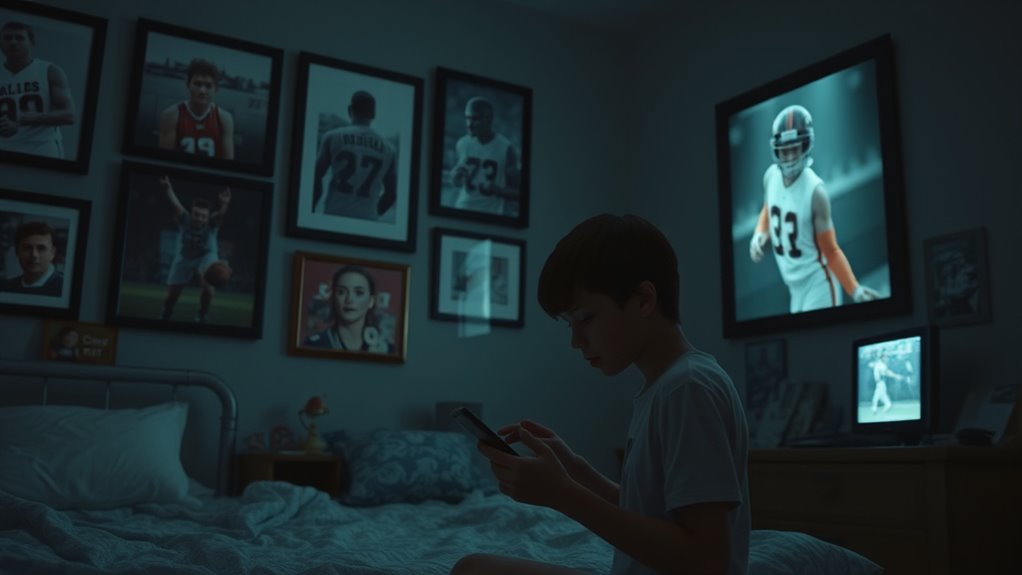
Media and social platforms amplify athletes’ presence beyond the game, making fans feel closer than ever. Your interactions, comments, and shares increase their digital reach, strengthening the parasocial bond. When athletes retire, this digital connection can intensify feelings of loss, as their online presence remains a constant reminder of their influence. Additionally, the Forsale 100 phenomenon can sometimes lead to feelings of disappointment or loss when fans realize that their favorite athletes are no longer actively part of the media landscape.
Digital Presence and Reach
Digital platforms have transformed how fans connect with athletes, extending their presence far beyond game days and interviews. Virtual fandoms thrive on social media and streaming sites, creating spaces where fans feel closer to their sports heroes. This digital intimacy allows you to follow athletes’ lives beyond their performances, fostering a sense of personal connection. Through posts, live streams, and behind-the-scenes content, athletes can share moments that deepen your sense of familiarity and loyalty. Their online reach makes it easier to stay engaged, building a virtual community that feels more intimate than ever before. When athletes retire, this expansive digital presence leaves fans grappling with the loss of a constant connection, intensifying parasocial grief. Additionally, understanding industry trends can help fans better navigate these digital relationships and cope with the transition.
Social Media Engagement
Social media platforms serve as the primary channels through which fans actively engage with athletes beyond their athletic performances. These platforms foster social engagement, allowing fans to follow their favorite athletes’ lives, opinions, and behind-the-scenes moments. This constant connection strengthens fan loyalty, creating a sense of intimacy and familiarity. When athletes retire, fans often feel a loss because their social engagement diminishes, making the athlete seem less accessible. Social media becomes a virtual space where fans express support, share memories, and maintain their parasocial bonds. The direct interaction offered by these platforms amplifies emotional attachment, making the retirement of an athlete feel like a personal loss. Additionally, understanding the divorce process in various states can highlight how legal and emotional transitions impact individuals, similar to how fans process changes in their sports idols’ careers. Ultimately, social media shapes how fans grieve and process the absence of their sports idols.
Common Signs of Parasocial Grief
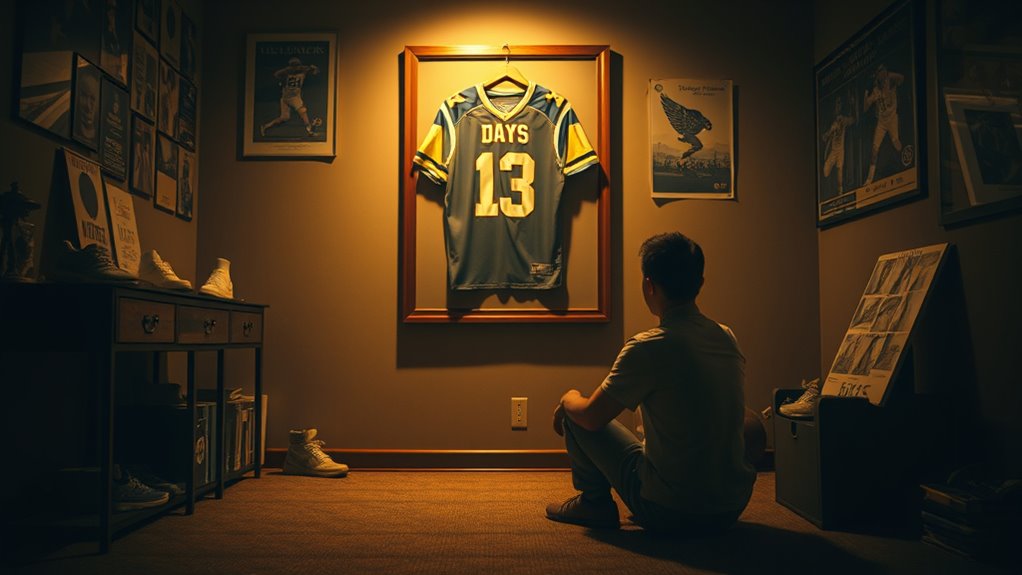
You might notice yourself feeling unusually emotional or missing the athlete more than you expected. Persistent nostalgia, like replaying old games or remembering special moments, can also be a sign. If these feelings stick around, they could indicate you’re experiencing parasocial grief. Some individuals may even find themselves seeking emotional comfort through these memories, which can reinforce the attachment.
Emotional Attachment Indicators
One of the clearest signs of parasocial grief is when fans experience intense emotional reactions to their favorite athletes’ retirement, as if they’ve lost a personal friend. This deep emotional response often reflects celebrity obsession and strong fandom loyalty. You might find yourself feeling sadness, anger, or even grief, despite having no direct relationship with the athlete. These feelings show how emotionally attached you are to their persona and career. You may also notice you’re checking social media obsessively for updates or reminiscing about past moments, trying to hold onto the connection. Such behaviors indicate that your attachment goes beyond casual fandom, signaling a genuine emotional investment that can be disrupted by the athlete’s retirement.
Persistent Nostalgia Feelings
When fans experience persistent feelings of nostalgia after an athlete’s retirement, it signals a deep emotional connection that extends beyond the sport itself. You may find yourself constantly reminiscing about memorable moments, feeling a nostalgic longing for the athlete’s presence. These feelings often stem from an emotional attachment that’s become intertwined with your identity or daily routines. Even as time passes, you might struggle to let go, replaying favorite games or interviews in your mind. This ongoing sense of longing reflects a desire to maintain the connection you once felt. Recognizing this pattern can help you understand how your emotional attachment influences your reactions to retirement, highlighting the significance of your parasocial bond and its impact on your grieving process. Incorporating emotional attachment into your awareness can provide clarity on why these feelings persist and how they shape your experience of loss.
How to Cope With the End of an Athlete’S Career
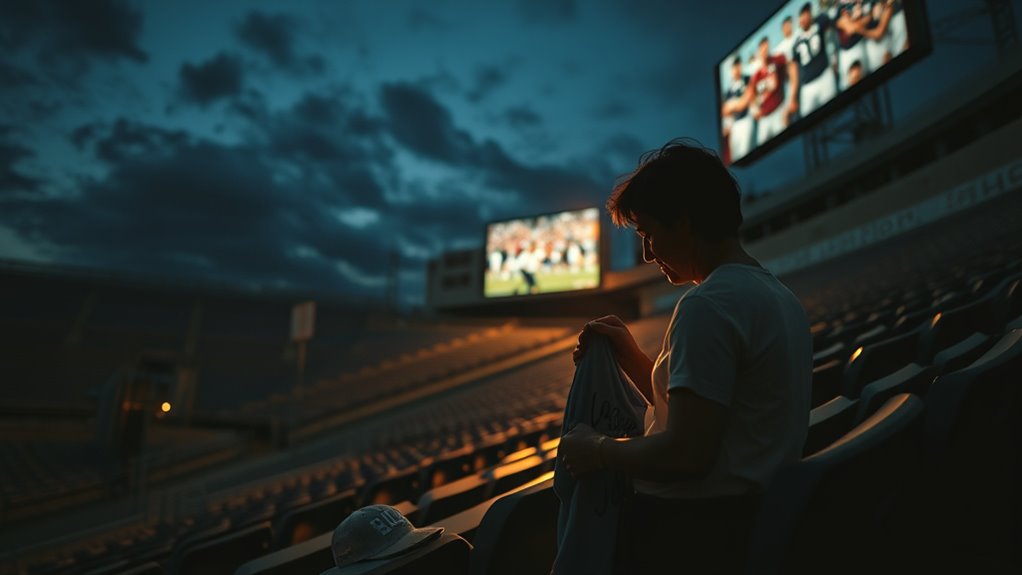
Ending an athlete’s career can feel like losing a close friend, especially if you’ve followed their journey for years. To cope, try shifting your focus from celebrity friendships to celebrating their accomplishments. Engage in fandom rituals like watching highlights or reminiscing about memorable moments, which can provide comfort without intensifying grief. It’s helpful to accept that athletes retire and that your connection was based on admiration, not daily interaction. Find new ways to enjoy sports, such as exploring different teams or sports that interest you. Connecting with other fans can also provide support and perspective. Remember, it’s okay to feel a loss, but redirecting your energy into positive activities and understanding that this is a natural part of an athlete’s career can ease your parabolic relationship. Additionally, practicing mindfulness and self-reflection can help process your emotions during this transition.
The Long-Term Effects on Fan Identity

Retirement can profoundly reshape your sense of identity as a fan, often prompting you to reevaluate what sports and athletes mean to you. You might notice your fan loyalty shifting or waning over time, especially if your connection was built around a specific athlete’s presence. These identity shifts can lead to feelings of loss or confusion, as you question whether your passion still holds the same significance. Long-term, you may find yourself developing new ways to connect with your team or sport, or even stepping back altogether. Your fandom evolves, influenced by the athlete’s retirement and your emotional response. Recognizing these changes allows you to better understand how your identity as a fan adapts beyond the athlete’s career, shaping your ongoing relationship with the sport. Being aware of emotional responses and their impact can help you navigate these feelings more effectively.
Strategies for Navigating Post-Retirement Emotions
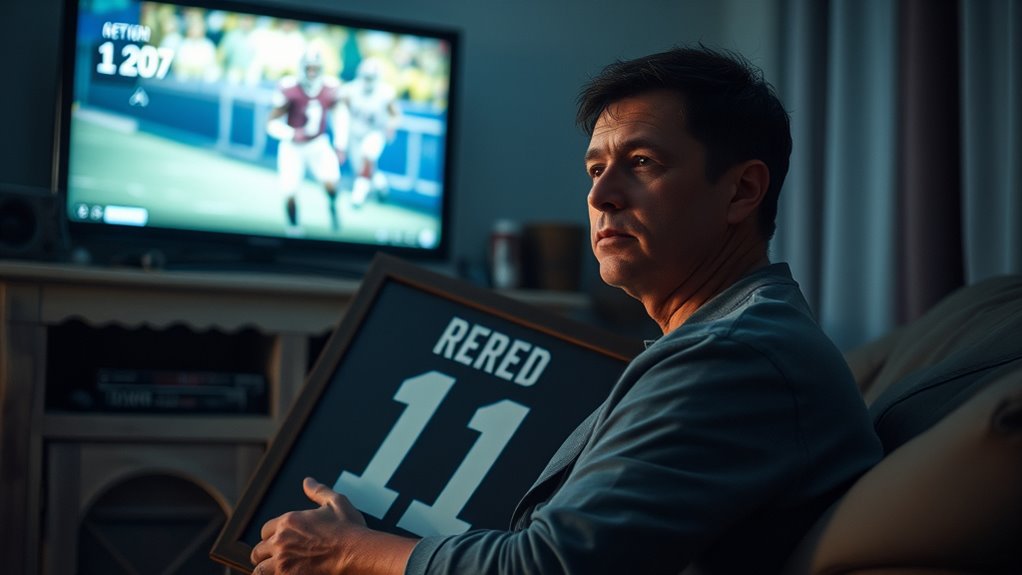
Managing emotions after an athlete’s retirement can be challenging, but adopting practical strategies can help you manage your feelings more effectively. First, connect with the fan community to share memories and find support. Second, curate your sports memorabilia collection to honor your favorite athlete without becoming overwhelmed. Third, consider engaging in new hobbies or activities to fill the void left by their departure. Here’s a quick guide:
| Strategy | Benefit |
|---|---|
| Join fan forums or groups | Builds community and provides emotional support |
| Personalize memorabilia | Creates a positive connection and preserves memories |
| Explore new sports or hobbies | Helps shift focus and develop new passions |
Frequently Asked Questions
How Do Parasocial Bonds Form Between Fans and Athletes?
You form parasocial bonds with athletes through celebrity admiration and emotional attachment. When you follow their careers, watch their games, and learn about their personal lives, you develop a sense of familiarity. Over time, this creates a one-sided relationship where you feel connected and invested in their successes and struggles. These bonds grow stronger with consistent engagement, making you feel like part of their journey, even without direct interaction.
Can Parasocial Grief Lead to Mental Health Issues?
When you experience parasocial grief, emotional dependency on a celebrity or athlete can intensify, making it hard to let go. This grief may lead to social isolation, as you withdraw from real-life interactions, impacting your mental health. Over time, feelings of loss and loneliness might develop into anxiety or depression. Recognizing these emotional responses helps you seek support and maintain healthier relationships beyond the parasocial bond.
How Does Age Influence the Intensity of Parasocial Grief?
Think of age sensitivity as a double-edged sword—your generation’s experiences shape how deeply you feel loss. As you age, generational differences influence the intensity of parasocial grief; younger folks may connect more emotionally due to digital immersion, while older individuals might process it differently. Your age impacts how you navigate this grief, making it more or less profound based on your stage in life and cultural context.
Are There Differences in Parasocial Grief Among Various Sports?
You might notice that parasocial grief varies across sports due to differences in athlete popularity and media exposure. Cross sport comparisons show that fans of highly publicized athletes, like football or basketball stars, often experience more intense grief. Sports with less media coverage or smaller fanbases tend to evoke milder reactions. Your emotional response depends on how prominently an athlete is featured and how deeply you connect with their persona.
What Role Do Childhood Memories Play in Fan Attachment?
Imagine holding onto a dusty photo album, each picture sparking childhood nostalgia. Your memories create powerful memory associations, strengthening your fan attachment. Those early experiences, like cheering for your favorite athlete or watching games with family, embed deeply in your mind. Childhood nostalgia fuels your emotional bond, making your connection to sports feel timeless and personal. This attachment persists, even when athletes retire, rooted in those treasured early memories.
Conclusion
As you watch your favorite athlete step back from the game, it’s like saying goodbye to an old friend whose laughter echoed in your daily routine. The stadium quiets, but their impact remains, woven into your memories. Remember, it’s okay to feel that ache. With time, new chapters unfold—your passion for the sport endures, and you’ll find new stories to cherish. Keep that flame alive; the game isn’t over, it’s just evolving.









